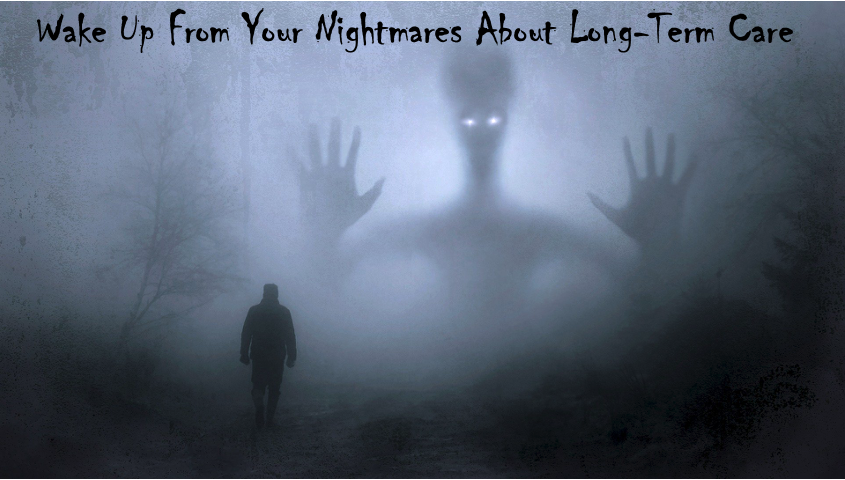Our bodies are “fearfully and wonderfully made” (Psalm 139) and though we may be grateful for whatever capabilities we have, we are also aware that under the surface of well-being, our bodies may be concocting dangerous changes to our health. If you are like me and have or had a beloved parent decline with dementia, you may fear that your genes are preparing the same path for you.
How can you deal with that pervasive worry, with that nightmare? Though the word “nightmare” comes into English in the 1300’s, the phenomenon of nightmares has always been with us. The word means that a demon or goblin has tormented you with a frightening dream. Though you may not believe in demons and goblins, there is a medical diagnosis called Nightmare Disorder.
Which capability would you be most frightened to lose: seeing, hearing, walking, speaking, remembering words and events, comprehending what someone is saying to you, identifying your loved ones?
Not only do we not want to lose any of them, we don’t want to even think about such changes. After I wrote my book on long-term care, I was regularly interviewed on radio. One radio host was working from a list of guests his producer provided for the various spots on his show. All he had were the notes he was given. He introduced me and then said with alarm, “So you’re talking about dementia. Well, if that happened to me, I’d jump out a second story window.” He hung up the phone and ended the segment. His fear of being less capable was so intense he could not even have a conversation about it.
The nightmare of a life-changing diagnosis doesn’t go away because you bolt the doors and hide under the covers. It goes away because you wake up, acknowledge you are afraid and then look at your options.
What are a few choices that can increase your sense of control and lessen the fear?
- Reduce your risks for dementia. Dementia is a catch all term for a group of symptoms. Alzheimer’s, a degenerative brain disease, is the most common form of dementia.
- Reduce your risks: enjoy a healthy diet; stay physically active; challenge your brain -keep learning; engage in social activities. (Read more at https://www.alz.org)
- Prepare for a disruption. Just as you would prepare for a hurricane, or bad weather conditions, consider what steps you can take to lessen the impact. Yes, it is easier to buy batteries, extra food, water, and plywood to cover windows, than it is to save money for a health crisis.
It is likely that your health insurance will not cover all your medical costs. It may cover the initial emergency after a car accident, a fall, a stroke, spinal cord injury, but it probably will not cover the long-term care that is called custodial. Medicare does not cover custodial care. If your assets have been reduced you may qualify for Medicaid, which does cover custodial care. How much your assets must be reduced to be eligible for Medicaid varies by state.
Can you save up enough to cover long-term care?
If you need long-term care, and want to be cared for in your own home, can you pay about $4,195 a month for one 44-hour shift for a home health aide? If you needed to cover the full 168 hours of a week that would be almost four shifts bringing the monthly cost to about $16,780. (Genworth Cost of Care Survey 2019 national median cost) Can you pay the home health aides and all your regular bills to maintain your home and anyone else living with you?
- Nurture a community of family and friends. Do you have enough devoted family and friends who are willing and able to care for you so that you do not need to pay for health aides?
- Adapt your house. Perhaps you could stay in your home with fewer helpers if the house were adapted so that you could be more independent. What changes might you have to make? What might those changes cost?
- Shift the burden. Have someone else pay for your care. Yes, an insurance company that provides long-term care insurance could pay the aides or pay for care in another setting like assisted living. If you are insured, you reduce the worry about paying for your care, and you are comforted by knowing professionals will be there to help you if, and when you need care.
- Waking up from your nightmares of needing long-term care comes from talking about the fear and taking actions that can blunt the impact. It’s like turning on the light. We can’t eliminate the possibility of a life changing diagnosis, but we can face it with courage and creative energy. We are more than our health and more than our illness. We are fearfully and wonderfully made.
All investing involves risk including loss of principal. No strategy assures success or protects against loss. This is a hypothetical example and is not representative of any specific situation. Your results will vary. The hypothetical rates of return used do not reflect the deduction of fees and charges inherent to investing.
Penelope S. Tzougros, PhD, ChFC, CLU. Financial Planner, Author, National Speaker. Wealthy Choices.com. 51 Sawyer Road, Suite 340, Waltham, MA 02453. Direct to Penelope 781 577 2311.
Penelope@wealthychoices.com. Fax 781 893 3565. In all 50 states, Penelope S. Tzougros is registered with, and securities and advisory services are offered through, LPL Financial, Member FINRA/SIPC. She is affiliated with Bay Financial Associates, LLC. Financial Planning is offered through Wealthy Choices® and Bay Financial Advisors, Inc. Both are registered investment advisors. Neither is a broker-dealer nor affiliated with LPL Financial.

